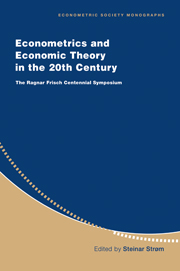Book contents
- Frontmatter
- PART I RAGNAR FRISCH AND HIS CONTRIBUTIONS TO ECONOMICS
- PART II UTILITY MEASUREMENT
- PART III PRODUCTION THEORY
- PART IV MICROECONOMIC POLICY
- PART V ECONOMETRIC METHODS
- 10 Scientific Explanation in Econometrics
- 11 An Autoregressive Distributed-Lag Modelling Approach to Cointegration Analysis
- 12 Econometric Issues Related to Errors in Variables in Financial Models
- 13 Statistical Analysis of Some Nonstationary Time Series
- PART VI MACRODYNAMICS
- PART VII MACROECONOMIC PLANNING
- Author Index
- Subject Index
12 - Econometric Issues Related to Errors in Variables in Financial Models
from PART V - ECONOMETRIC METHODS
Published online by Cambridge University Press: 05 January 2013
- Frontmatter
- PART I RAGNAR FRISCH AND HIS CONTRIBUTIONS TO ECONOMICS
- PART II UTILITY MEASUREMENT
- PART III PRODUCTION THEORY
- PART IV MICROECONOMIC POLICY
- PART V ECONOMETRIC METHODS
- 10 Scientific Explanation in Econometrics
- 11 An Autoregressive Distributed-Lag Modelling Approach to Cointegration Analysis
- 12 Econometric Issues Related to Errors in Variables in Financial Models
- 13 Statistical Analysis of Some Nonstationary Time Series
- PART VI MACRODYNAMICS
- PART VII MACROECONOMIC PLANNING
- Author Index
- Subject Index
Summary
Introduction
Ragnar Frisch worked with errors-in-variables (EIV) models. Later researchers in econometrics moved the field in the direction of errors in equations. That situation was partially rectified in the early 1970s by the contributions of Goldberger (1972) and Griliches (1974) and later surveys by Griliches (1985) and Chamberlain and Goldberger (1990), but EIV models still occupy a back seat in econometrics. When I was revising my Introduction to Econometrics (Maddala, 1992), reviewers unanimously suggested that I drop the chapter on “Errors in Variables” (it is “never used”) and add more interesting and useful topics like unit roots and cointegration.
Empirical researchers, however, have to face the problems of errorsin variables all the time. This essay discusses that problem in the contextof financial models in which proxies are used for unobservables almostall the time. In the following sections we shall discuss this problem withreference to the following topics:
tests of the capital-asset pricing model
tests of the arbitrage pricing theory, using observed macroeconomic variables as proxies for unobserved factors
measuring market responses to corporate pronouncements (dividends, stock splits, etc.), also known as testing signaling models
portfolio performance measures
Information
- Type
- Chapter
- Information
- Econometrics and Economic Theory in the 20th CenturyThe Ragnar Frisch Centennial Symposium, pp. 414 - 432Publisher: Cambridge University PressPrint publication year: 1999
Accessibility standard: Unknown
Why this information is here
This section outlines the accessibility features of this content - including support for screen readers, full keyboard navigation and high-contrast display options. This may not be relevant for you.Accessibility Information
- 1
- Cited by
